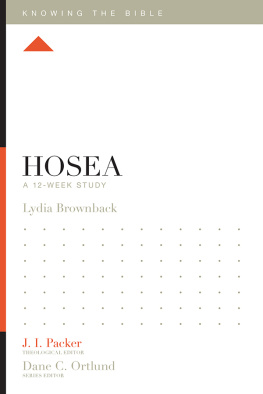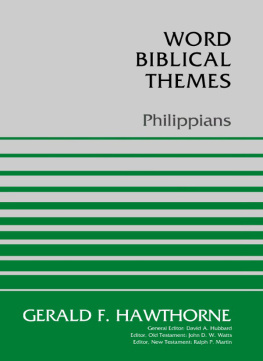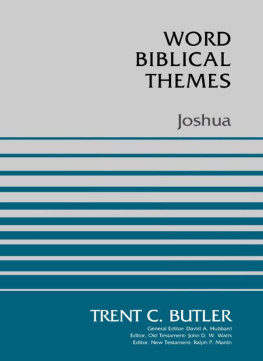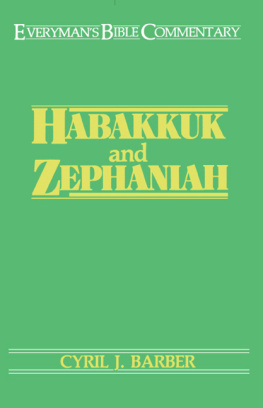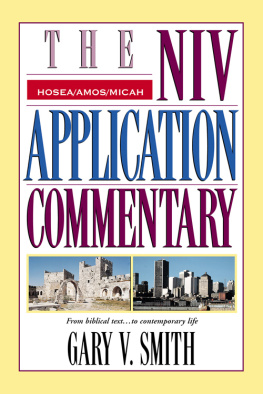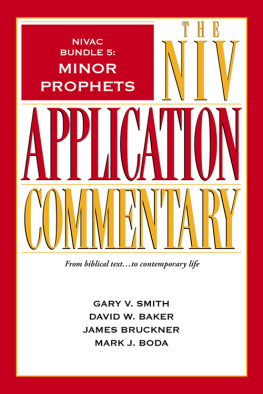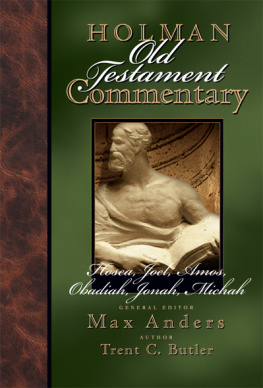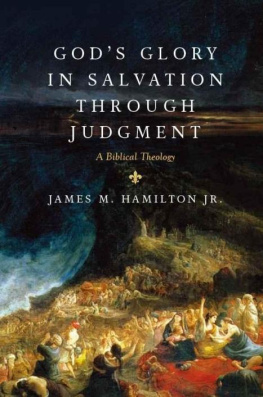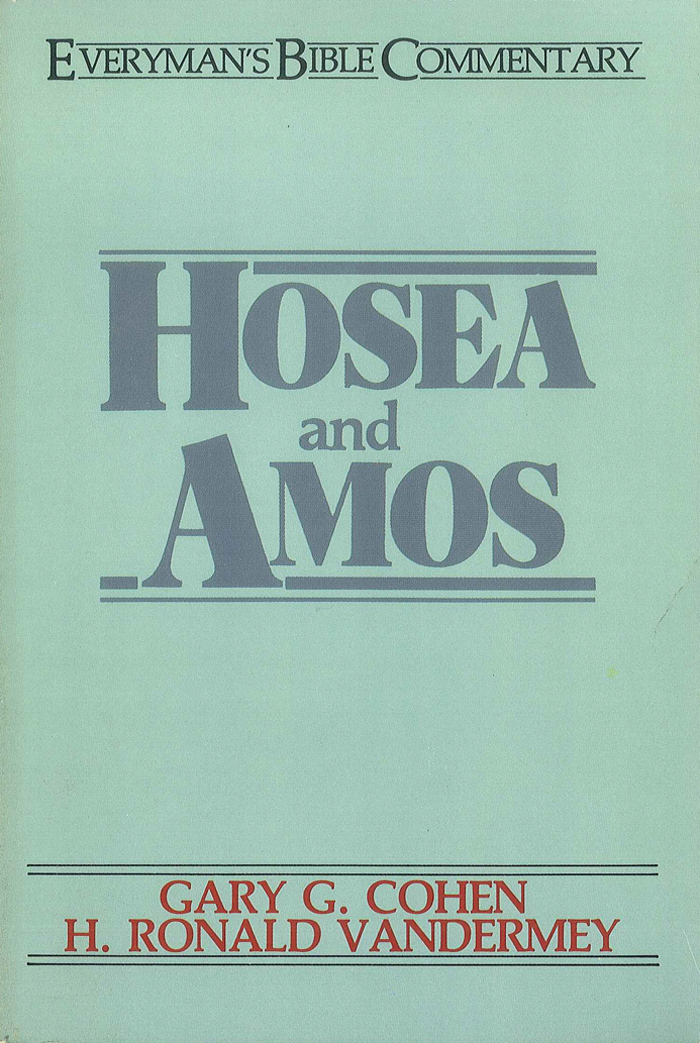HOSEA
by
H. RONALD VANDERMEY

AMOS
by
GARY G. COHEN
MOODY PRESS
CHICAGO
1981 by
T HE M OODY B IBLE I NSTITUTE
OF C HICAGO
All rights reserved. No part of this book may be reproduced in any form without permission in writing from the publisher, except in the case of brief quotations embodied in critical articles or reviews.
All Scripture quotations, except those otherwise noted, are from the New American Standard Bible, 1960, 1962, 1963, 1968, 1971, 1972, 1973, 1975, and 1977 by The Lockman Foundation and are used by permission.
Library of Congress Cataloging in Publication Data
Vandermey, H. Ronald.
Hosea.
Bibliography: pp. 79-80, 172.
1. Bible. O.T. HoseaCommentaries. 2, Bible. O.T. AmosCommentaries. I. Cohen, Gary G. Amos. 1981. II. Title. Ill. Title: Amos.
BS1565.3.V34 | 224.607 | 81-1781 |
7 Printing/EP/Year 92 91 90 89
Printed in the United States of America
CONTENTS
CHAPTER
INTRODUCTION TO THE LATE
EIGHTH-CENTURY PROPHETS
In the eighth century B.C . God sent Four Prophetic Horsemen to warn His sleeping people of the great dangers ahead. Those prophetic riders appeared out of nowhere, one by one, and shouted their sacred proclamations of the doom ahead. They warned the astonished crowds to flee to God for mercy and to abandon their sinful ways of living. The names of the four members of this noble band were Amos (764-755 B.C .), Hosea (755-717 B.C .), Isaiah (739-690 B.C .), and Micah (735-700 B.C .). The exactness of dates for their years of prophesying is not certain in all cases. However, present biblical and extra-biblical data assure us that the dates are sufficiently accurate.
The excitement that surrounds the messages of these four men is the result mainly of their warnings urgency. They lived during the final years of the Northern Kingdom (Israel) and were the spokesmen of Gods final pleas to the wayward ten tribes of Israel. What an awesome responsibility was theirsto deliver Gods last warning to a heretofore blessed nation and to announce that, unless there was a national repentance soon, there would be a national doom shortly. These prophets addressed a nation living upon a shaky foundation, which supported tottering military and political beams. That situationa sinful people living in days of luxury but political uncertaintymakes the messages of these men still relevant for todays man who lives well but yet is faced on every hand with threats of wars and rumors of wars.
The beautiful thing is that the writings of these heralds of God, amid the proclamations of coming chastisement, also presented a solution to Israels problemnational repentance and a return to God. These good physicians of the past still have within their biblical journals Gods prescriptions for peace, both nationally and individually, if modern man will only take the prescriptions. Sadly, both Israel (the Northern Kingdom) and Judah (the Southern Kingdom) refused, and the prophesied miseries came upon them.
It is hoped that people today will learn some of the lessons from these ancient teachers and will experience the promised blessings, rather than the sure and certain punishments that are the portion of those who ignore Gods teachings.
M ICAH (735-700 B.C .)
Micah presented a message of woe not only to the ten northern tribes, but also to the Southern Kingdom of Judah, which was to fall a century and a quarter after the fall of her northern sister. As he stood safely in Jerusalem in 722 B.C ., the prophet Micah heard tearfully that the unrepentant northern tribes were being destroyed and conquered by the cruel pagan giant Assyria. As he heard daily of towns and cities burning and of their people being captured and taken into captivity, he continued to rebuke the equally self-satisfied nation of Judah. As that news from the north drifted southward and stunned the minds of the people in Judah to the reality of Gods prophetic dooms, Micah still rebuked them. Yet in the end Judah would not listen, and God would bring the fierce Babylonian hordes down upon her. The Babylonians came first in 605 B.C ., then again in 597 B.C ., and finally once more in 586 B.C . when even the Temple of Solomon was pulled down and burned. Oh, that our generation also would hear the call of Micah and be spared the agony of Gods rod!
I SAIAH (739-690 B.C .)
Isaiah, like Micah, spoke from Jerusalem. Isaiah 28 denounces the sins of the Northern Kingdom, but almost all the rest of the books sixty-six chapters warns and pleads with the Southern Kingdom to forsake her sins while there is yet time to repent. Yet his negative prophecies strike a positive note as they abound with the final solution to Israels problems, the coming of the Messianic deliverer (Isa. 7:14; 9; 11; 52:1353: 12).
A MOS (764-755 B.C .); H OSEA (755-717 B.C .)
Amos and Hosea, however, were the pair whom God used (one right after the other, like their predecessors Elijah and Elisha) to announce to both the Northern and Southern Kingdoms that His patience at last had ended and that their hour of decision had arrived. They voiced the challenge that Israel and Judah either must repent right then or face Gods immediate judgment of conquest and rapine by the merciless Assyrians. For Israel, that would mean complete scattering of the population within a generation and an end of the ten tribes as a nation. For Judah, such judgment would mean the destruction of her land by the rampaging Assyrians. It would also be a harbinger of Judahs captivity at the hands of the Babylonians a century and a half later. Thus, unrepentant sister followed unrepentant sister in grief while Gods prophets stood atop the hills, knocked down the altars to Baal, and wept.
Amos especially portrays to us that in Samaria, the capital city of Israel, kings and princes sat at ease in Zion (6:1), trusting in their foreign policy to keep them safe, instead of trusting in the Lord of Hosts. How much like that is modern America, sitting rich and at ease in Zion as dishonesty, immorality, and unbelief threaten to engulf the character of a once great nation. God is increasingly despised as profanity and even blasphemies can be heard daily over TVand few protest. We too, like Israel of the eighth century B.C ., are wealthy, strong, and trusting in our economy and foreign policy to deliver us, while Christ stands so often ignored as He knocks at the door of the national heart and at the doors of individual hearts (Rev. 3:20). Consider some of the major events of the 1970s; the similarity is so marked and plain that it is frighteningAmericas failure to reach its objectives in Vietnam, its standing by while Cambodia was raped by the Khmer Rouge; which was followed by the loss of the Panama Canal, the taking of fifty American hostages in Iran, and then the Russian invasion of Afganistan. Surely those events have their roots in a forsaking of God rather than merely in foreign policy miscalculations.
Yet Hosea emphasizes that despite the severity of the coming chastening, Gods love will not entirely forsake those whom He once loved. No, in the end times He will gather up Israel, cleanse her, and restore her to a favor that will transcend even His former first love for her. Gods love and willingness to forgive rings out to every generation that studies this prophet. (Read 1 John 1:9 concerning confession and forgiveness.)


